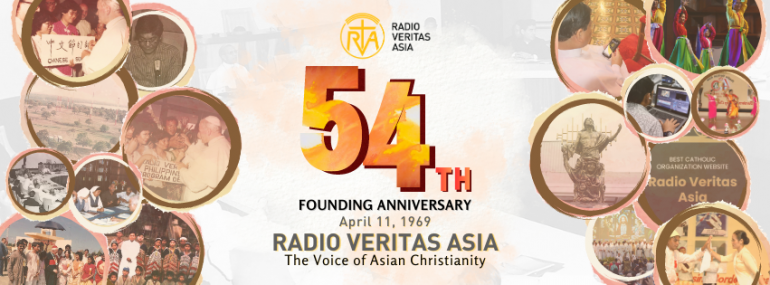Radio Veritas Asia marks 54th year, keen on carrying on its Mission

Inspired and strengthened by the words and blessings of Popes, Radio Veritas Asia (RVA), the media platform of the Catholic Church in Asia, is committed to continuing its ministry far beyond its 54-year mileage.
"This great enterprise and such an important work should echo the teachings of Christ and lift hearts to God's truth and love," Pope Paul VI said of the radio station when he visited and blessed it in 1970.
John Paul II described it as the "voice of Asian Christianity" when he visited in 1981. In his Ecclesia in Asia, an apostolic exhortation in 1999 after the Special Synod in Rome the year before, he said the radio station was an "excellent instrument of mission."
Looking back
In 1958, bishops from Asia and Australia meeting was held at the University of Santo Tomas (UST) in Manila. One of the offshoots of that event was the conceptualization of a Catholic radio station in Asia to further broaden the reach of evangelization.
The prelates' idea was five years ahead of the Second Vatican Council's "Inter Mirifica" (The Means of Social Communication) in 1963. The Inter Mirifica, one of the 16 magisterial documents from the Second Vatican Council, says that the Church will use the media to spread the Gospel.
The bishops decided to set up the radio station in the Philippines, a predominantly Catholic nation in Asia.
With the support of the German Catholics, RVA's broadcasting facility in Fairview, Quezon City, was inaugurated on April 11, 1969, by Cardinal Antonio Samore, a Vatican official, and Cardinal Rufino Santos, the Archbishop of Manila at the time.
The radio station was built on property donated by the family of Jose Yulo.
RVA became the first continental radio station of the Catholic Church.
In 1967, test broadcasts commenced. On April 11, 1969, the first overseas broadcast began with two 100 KW transmitters.
Harnessing technological advancement, RVA migrated from shortwave-radio to digital platforms in 2018.
Accolades
The Catholic Social Media Awards recognized RVA as the Best Catholic Organization Website on February 18, 2023. The website in English bagged the award. On websites and social media, RVA content is shared in English and 21 Asian languages.
RVA also receives the Ramon Magsaysay Award for Journalism, Literature, and Creative Communication Art. It was recognized for its coverage of Sen. Benigno Aquino Sr.'s assassination in 1983 and the EDSA revolt in 1986. The Ramon Magsaysay Award is the most prestigious in Asia.
RVA's taped coverage of the EDSA uprising is stored in its archives. Also, the audio version of the coverage was registered in UNESCO's Memory of the World Program. The program aims to help preserve documentary heritage, especially in areas affected by conflicts and natural disasters.
The EDSA uprising in 1986, also known as the "People Power Revolution," ended Marcos' dictatorial regime. He ruled the Philippines for 21 years.
Mission
RVA advocates justice for people with low incomes through programs. It also seeks to serve as a voice for peace and harmony among sects, races, and sexes. RVA also espouses dialogue among different religious beliefs.
On October 12, 2022, RVA featured an Iglesia ni Cristo (INC) member who champions humanity and the environment through painting. INC is the 3rd largest church in the Philippines in terms of membership.
RVA also featured a Hindu monk who brings joy to people experiencing poverty by offering them goods on October 6, 2022. The monk is a member of the Ramakrishna Movement.
RVA provides services in English and 21 Asian languages, including Bengali, Chin Falam, Chin Hakha, Chin Tedim, Hindi, Hmong, Kachin Jinghpaw, Kachin Lisu, Kachin Rawang, Karen Sgaw, Karen Pwo, K'Cho, Khmer, Mandarin, Myanmar, Sinhala, Tamil, Telugu, Urdu, Vietnamese, and Zo.
RVA stays true to its primary goal of spreading the Gospel to all the people of Asia and beyond by talking with people from different religions and cultures who are poor.
Radio Veritas Asia (RVA), a media platform of the Catholic Church, aims to share Christ. RVA started in 1969 as a continental Catholic radio station to serve Asian countries in their respective local language, thus earning the tag “the Voice of Asian Christianity.” Responding to the emerging context, RVA embraced media platforms to connect with the global Asian audience via its 21 language websites and various social media platforms.














